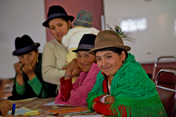2005
Engaging Indigenous women: local-government capacity-building through new technologies in Latin America

![]()

In December 2005, the General Assembly approved the project entitled Engaging indigenous women: local-government capacity-building through new technologies in Latin America under the Development Account. The main objective of this project is to strengthen the capacity of institutions at the national and community levels in Bolivia, Ecuador and Perú to engage indigenous women in decision-making processes by utilizing new information and communication technologies (see document A/60/6(Sect. 34), annex, sect. W, for a fuller description). Through capacity building and indigenous women’s meaningful participation, the project intends to elevate indigenous women’s self awareness and esteem in critical areas, improve their participation in decision-making processes and promote self-affirmation of their cultural and gender identities. The project is implemented by the Secretariat of the United NationsPermanent Forum on Indigenous Issues (SPFII) in cooperation with other United Nations bodies and indigenous women’s organizations.
The project responds to the emphasis placed by the UN Permanent Forum at its various sessions on the importance of technical cooperation and capacity building programmes regarding and involving indigenous women, and its recommendation that the Department of Economic and Social Affairs (DESA) conduct such programmes (E/2004/43). In addition, the goals of the project are in accordance with General Assembly resolution 59/174 adopted on 20 December 2004, in which the Assembly proclaimed the Second International Decade of the World’s Indigenous People, commencing on 1 January 2005. According to the resolution, the goal of the Second Decade “shall be the further strengthening of international cooperation for the solution of problems faced by indigenous people by means of action-oriented programmes and specific projects, increased technical assistance and relevant standard-setting activities.” The objectives and Programme of Action of the Second Decade adopted by GA resolution A/60/270 Section II, place major emphasis on capacity building, which is the major focus of this project. ![]()
![]()
Methodology
In order to achieve the project’s principal goal of “empower[ing] indigenous women in decision-making processes” and in keeping with the principle of free, prior and informed consent, indigenous women are actively participating in project planning, implementation, monitoring and evaluation.
The early involvement of indigenous organizations as well as governments/municipalities in the implementatino of the project is also essential to the sustainability of the project. By involving authorities at the local and federal level as well as community members, a sense of ownership is fostered, facilitating continuity.
Through capacity building and indigenous women’s meaningful participation, the project intends to elevate indigenous women’s self confidence and capacity in critical areas, improving their participation in decision-making processes and promoting self-confidence of their cultural and gender identities.
The project shall also establish and/or support local and regional networks connecting communities with local and national government(s) and promoting self-sustaining connectivity initiatives. The substantive focus of the program lies in the areas of capacity-building, development, analysis, production and dissemination of relevant and appropriate ICT material that will reach a broader number of indigenous women as well as governmental institutions and the UN system.
Activities
Working in close cooperation with indigenous women’s organizations in the three countries, the following activities have been carried out:
Conduct broad assessments of communicational situation of indigenous women in each country
The study included a review and identification of existing connectivity initiatives of indigenous women’s groups (stakeholders involved, achievements and challenges, sustainability of the initiatives, lessons learned), availability of infrastructure, human, technical and financial resources, and areas where capacity building is needed. Exploratory missions took place to the three countries with the main purpose of forging partnership with government institutions, media and other means of communication, indigenous organizations and UN system entities.
Review existing content that addresses indigenous peoples’ issues, especially indigenous women’s issues
After a compilation of media materials -including radio, audiovisual and printed press materials- INSTRAW analyzed how identities and stereotypes are shaped and formulated proposals for changed content that would increase indigenous women’s empowerment.
Organize workshops in each country
Three workshops have been held to share experiences between indigenous women’s organizations, local governments, UN system and media institutions, to provide guidelines for the production of material, to develop proposals for engaging national and local government based on the identified priority needs and to forge partnership with government institutions, media and other means of communication, indigenous organizations and UN system entities.
Taking into account the incomes produced through these activities, the participating indigenous women’s organizations are designing their own projects.
Documents
Assessment of communicational situation of indigenous women in Bolivia (Spanish only)
Assessment of communicational situation of indigenous women in Ecuador (Spanish only)
Assessment of communicational situation of indigenous women in Peru (Spanish only)
Report of the workshop in Lima, Peru (Spanish only)
Report of the workshop in Latacunga, Ecuador (Spanish only)
Report of the workshop in La Paz, Bolivia (Spanish only)
Review of existing content addressing indigenous peoples issues (Spanish only)
Consentimiento previo informado y libre: cómo hacerlo en realidad (Spanish Only)
For more information about Indigenous Issues, please visit: http://www.un.org/esa/socdev/unpfii/index.html
 Welcome to the United Nations
Welcome to the United Nations